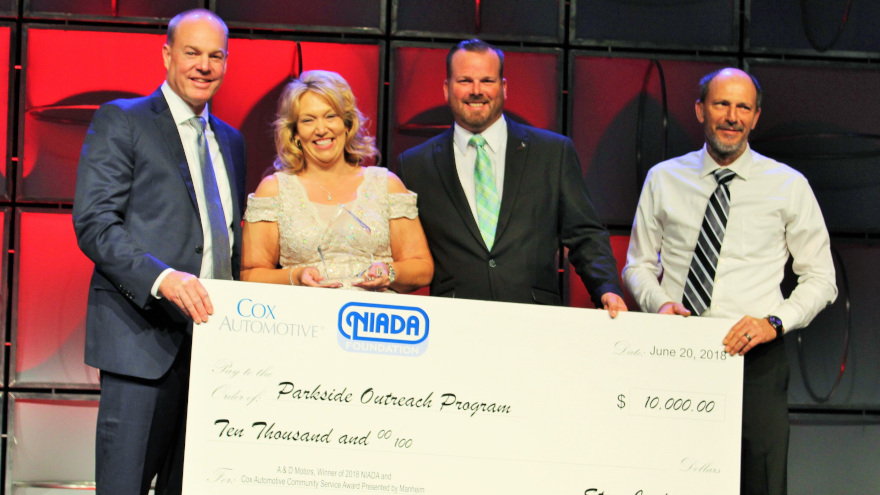The most recent changes to the federal tax code certainly generated plenty of attention. But Steven Carstens — a partner at Shilson, Goldberg, Cheung & Associates, which is an accounting firm that specializes in the buy-here, pay-here industry — thinks the windfall for independent dealers might not be as fruitful as some lawmakers hailed.
Furthermore, along with describing the impact of the federal tax code changes, Carstens also elaborated about an accounting change coming that’s connected with operator facilities and could have a “long-term effect on dealers.”
During a conversation with BHPH Report, Carstens began by stating, “Right off the bat, the new tax rules do lower the overall tax rates for businesses, so that is a good thing.
“However, for all flowed-through businesses, which are S corporations, LLCs and partnerships, you actually have to jump through certain loopholes and meet certain requirements in order to enjoy the lower tax rates,” he continued. “So, many businesses will actually have to work closely with their accountants to make sure their business is hitting the requirements of what we call the 199-A deduction in order to enjoy the lowest tax rate.
“Now C corporations get a flat, 21-percent tax rate, which is the lowest corporate taxes have ever been,” Carstens went on to say. “However, most dealers are not set up as C corporations because in the past, corporations were generally for large businesses.”
Carstens shared that conversations this past year with clients and accounting contemporaries included debate over whether wide swaths of BHPH operators should change their organizational structure to secure this tax possibility. But Carstens pointed out a possible significant ramification if dealers made what might initially seem as simple as switching to a vehicle with an automatic transmission from one that has a manual gearbox.
“The answer, on the face of it, it seems simple. Convert and get a lower tax rate. But C corporations have some tricks to them that dealers aren’t thinking carefully about,” Carstens said. “And the biggest trick with the C corporation is that it is subject to what we call double taxation.
“An owner when he takes the profits out of a C corporation, gets taxed as second time at up to 24 percent. So the business paid 21 percent, and then if the owner takes the money out of the business, he pays the second tax of up to 24 percent. So if not done right, you could be paying taxes of maybe 45 percent on a C coorperation because you didn’t think the whole situation through,” he continued.
“It has a lot to do with whether the dealer is in growth mode, where there’s not going to be a lot of distributions out of the company or whether the company is a mature company where the owners are starting to reap their profits back out of the business. And if they are, then that double taxation will make the C corporation far less attractive than what has traditionally been used, which is an S corporation,” Carstens went on to say.
New tax law impacting losses
Carstens also explained how federal tax law impacted how dealerships can use losses to their benefit. He indicated operators no longer can carry back losses.
“In the past, you were allowed to amend your prior tax return and push your loss backwards and claim back the taxes you paid in prior years. You may no longer do that. Losses can only be carried forward. So you will just have to hold onto a loss until a future year when you have a profit, and you can use your loss in the future. You cannot carry it back anymore,” Carstens said.
Carstens also touched on how a rule change also was associated with operators who use the cash basis of accounting, rather than leveraging a related finance company.
“One of the other changes is that companies up to $25 million in revenue may use the cash basis of accounting. If a dealer can use the cash basis of accounting, then there would be no need to run a separate related finance company in order to get a good tax answer,” Carsten said.
“However, unfortunately there are many other rules in tax code that kind of take away the benefit for someone who has long-term receivables like a buy-here, pay-here dealer does,” he continued. “Those rules effectively cancel out any benefit that switching to a cash basis could generate for a dealer.
“After some research, the talk on switching to cash basis has fallen away and dealers are still best served using accrual basis with a separate related finance company,” Carstens went on to say. “The cash basis really is not of any use to a dealer because of some old tax rules that were never changed and still exist related to long-term receivables.”
Big changes from FASB
To recap, the Financial Accounting Standards Board (FASB) is looking to ensure that BHPH dealers and other financial institutions have solid measures in place to ensure they have appropriate reserves for any future losses based on the life of each auto loan. As a result, the board has instituted its new Current Expected Credit Loss model (CECL).
The new model will require higher levels of loan loss reserves and lead to changes in lending practices and portfolio management. It will also require a significant amount of data capture, analysis and modeling to meet the implementation.
Carstens pointed out that private, independent dealerships won’t have to comply with these new standards until 2021.
“Honestly, dealers have not put a lot of effort into this standard. Things like accounting standards dealers are very much, ‘I’ll put off until tomorrow what I don’t absolutely have to do today.’ They have inquired, but very few are doing any actual work on it because it’s very much going to be a one-time, catch-up adjustment. Dealers haven’t worried about it too much because in the year it goes into effect, they will make the catch up, they will notify their bank and they will move forward beyond it,” Carstens said.
“It shouldn’t have much of a loss. Once you’ve made the catch up and you’ve dealt with the effect on your financials, it shouldn’t have too much of a lasting effect,” he continued.
“The calculation is much more complicated, and we’ll have to put in procedures on how to calculate it going forward. But I think most dealers just assume their accountants will tell them what they have to do, make the necessary calculations, make the one-time adjustment and move forward,” he went on to say.
Another rule from the FASB won’t go into effect until 2020, but Carstens suspects the impact on BHPH dealerships could be much more significant. The FASB said a property lease an operator signs for his showroom, lot and other facilities will be counted as debt.
“So if a dealer signs up a 10-year lease for his dealership, those 10 years of payments are actually listed as debt on your financials the second you sign that lease, which totally changes your debt-to-equity ratios and your entire financial statement,” Carstens said.
“Signing a 10-year lease, that might be $1 million of total payments that you suddenly have to call debt on your books because you’ve signed a contract to pay someone. The new accounting rules say, ‘Well, that sounds like debt,’ so they call it debt,” he continued.
“Now conversely, they do get to show an asset on their books because now they have control of that piece of land for 10 years,” Carstens went on to say. “So the accounting rules will say, ‘Well, you have this debt, but you also sort of have an asset, which is the use of this property.’ But for certain covenants like debt-to-equity, you’ve added debt without changing your equity and you will definitely blow some of your banking covenants because of this rule. It will definitely make your debt situation look a lot worse on your just because you might have four or five property leases that are now debt.”
Carstens noted that he’s notified all of his dealer clients about this change even though it’s five years away from being enacted.
“I think this could have a long-term effect on dealers,” he said.
And with regard to the lease matter, Carstens added a caveat.
“Small dealers whose financials are prepared under what we call the income tax basis of accounting — meaning they just do the financials just so that they can file their taxes — are not impacted by either of these rules, because the IRS isn’t changing anything,” he said. “This is for larger dealers who report to banks and have to follow generally accepted accounting principles. They have to follow these new rules.
Smaller dealers who simply do the books just to file taxes and follow what we call the income tax basis of accounting, these rules have no effect. You’d have to follow the tax rules, not accounting rules,” Carstens added.
More emphasis on accounting
With all of the complicated matters, Carstens highlighted that dealers of all size are turning to accounting specialists to manage their books.
“I will give dealers some props for improving their accounting practices. Dealers years ago, they really did not put any emphasis on accounting. But now they are becoming more sophisticated and placing more emphasis on accounting for couple of major reasons,” Carstens said.
“This business has become much more competitive, and the profit margins have dropped a lot, and so dealers are watching every expense and trying to run slim operations,” he continued. “The only way to do that is to have good accounting records and to monitor things. Dealers have become far more interested in the financial statements over the last few years in order to stay competitive.
“Secondly, most buy-here, pay-here dealers have bank loans, and the bankers are under increased pressure for any loans that they made to the subprime industries such as the buy-here, pay-here industry,” Carstens went on to say. “They have far more stringent reporting regulations after the crash, and that puts more pressure on dealers to report more frequently and more in depth. The bank has had put a lot more pressure on dealers and the type of reporting they do in addition to the frequency of the reporting they do. Dealers have had no choice but to improve their accounting department to meet that.”
Gyms are packed in January; then half empty in February. Individuals struggle to achieve their goals, and so do organizations like buy-here, pay-here dealerships — sometimes for different reasons.
For more than 30 years, Jim Jackson has worked as a performance coach to leaders, business owners and sports teams — both professional and college. He is a renowned motivational expert who inspires people to take risks which enables them to outperform their own expectations.
Jim recently concluded his five-year tenure as president of Oak Motors, a buy-here, pay-here store in Indianapolis. He has returned to coaching leaders at a variety of organizations and speaking at events.
In a compelling interview, Jim shares why organizations and individuals fail to achieve their goals and what to do about it.
Download the 20-minute interview for free at the bottom of this page by going to this website.
Kenny Atcheson is the founder of Dealer Profit Pros and author of Marketing Battleground: How to Deploy Under-the-Radar Strategies to Explode Your Profits. Kenny teaches workshops and speaks at conventions and 20 Groups. His company offers several marketing and advertising programs which include a Newsletter Program, Private Consulting, a Referral Results Training Program, an Online Review Boosting System, Google Pay-Per-Click Management, Facebook Pay-Per-Click Management, Direct Mail Campaigns, Copywriting, and more. His website can be found at www.DealerProfitPros.com.
Two platforms used by an array of independent and buy-here, pay-here dealerships now work together.
According to a news release distributed on Wednesday, Selly Automotive’s customer relationship management (CRM) platform is now integrated with Friday Systems Lot Wizard dealer management software (DMS).
The companies highlighted this partnership will allow sales and inventory data to sync for dealerships to expand their knowledge about the customer during the sales process.
“This integration reinforces our commitment to providing affordable integrated solutions for independent and BHPH dealerships. We worked closely with the Friday Systems team to ensure inventory and sales data will be integrated for Lot Wizard Pro,” Selly Automotive chief executive officer Zach Klempf said.
Friday Systems strives to provide cutting edge solutions in dealer software by staying on top of the ever-changing landscape of the business and modifying the software to help dealerships stay in compliance.
“We’re excited to offer Selly Automotive’s CRM as an extension to our existing customer management tool in Lot Wizard Pro,” Friday Systems president Kerry Wiest said.
“This CRM will provide greater purpose to the independent and BHPH dealerships’ dealer management system (DMS) data, while sustaining our culture of affordable prices and comprehensive, reliable services,” Wiest went on to say.
For more information about Selly Automotive, visit www.sellyautomotive.com or call (888) 246-1372. For more information about Friday Systems, visit www.lotwizard.com or call (800) 677-7160.
Buy-here, pay-here dealers who are looking to bolster their business development centers now have another training opportunity.
A new online video education series for automotive retailers — PDS On the Rocks — has attracted the attention of thousands of car dealers, managers and employees across the country — all hungry for valuable information on how to improve business processes, sales, and create a culture of business development.
PDS on the Rocks is an unscripted video education series covering all aspects of business development from Proactive Dealer Solutions. The Huntersville, N.C.-based international company has assisted more than 3,000 dealerships in creating business development centers during the past 25 years.
Company leadership highlighted PDS on the Rocks offers insights into industry best practices and success stories. Top executives and trainers at PDS, with more than 100 years of combined experience in the retail automotive industry, offer their insights during short panel discussions on a variety of automotive retail topics.
The firm mentioned its high-quality video and audio education sessions are produced at PDS’ studios in North Carolina. These facilities also serve to generate hundreds of training videos for PDS clients that cover a complete range of BDC, sales, service, communications,and business development culture topics.
“We created the series in response to the need we see in the marketplace,” said Jason Beckett, general manager of Proactive Dealer Solutions. “We hear directly from manufacturers and dealers throughout the country and they tell us they need greater business development insights to improve their competitiveness. We know from our experience that video training is by far the best and most successful platform to accomplish this.”
Some episodes available include answers to the dealer question: Is a BDC right for you? Another installment offers granular detail in the episode titled, “5 Easy Steps to Master a Call.”
PDS success manager director Tiffany Peeler offers her expertise on how to train staff to master a call. Peeler leads a team of success managers that work directly with a dealer’s sales, service, and BDC teams on a daily basis. Over the years, she has gained valuable insight into the issues that lead to successful phone interaction with clients and prospects.
“It’s vital to smile through the phone when answering a call,” Peeler tells the viewers. “In many cases, this phone call may be the first interaction a customer has with your dealership. They need to hear a warm, friendly voice on the other end of the line. Whoever takes the call, receptionist, manager, sales or service representative, needs to interact with an inviting tone, repeat the name of the dealership, and ask how he or she can help the customer today.”
Peeler said while this may seem like common sense, it’s vital this process is done on every call regardless of time of day, mood of the employee, or any other issues.
“It’s cliché, but you only get one chance to make a good first impression,” she said.
The videos are available on PDS’ YouTube Channel that’s located here.
“We wanted to talk about what is happening in the industry in terms of business development,” said Barrett Schrader, PDS vice president of business development. “We created a series of videos where we could discuss important topics and issues, but in a conversational style. The videos are concise, stay on topic, and importantly communicate a wealth of insight that can improve your business practices and make or save you more money.”
Beckett added, “We’re seeing a ton of organic growth from these videos. Dealers are sharing the videos with managers, and managers are sharing the videos with their teams.”
For more information about firm, go to www.bdcexperts.com.
This one cuts close to home because the dealer in question is local to us at Ignite Consulting Partners, and I fear that a significant number of BHPH dealers are similarly vulnerable. And now, there is yet another case on the books that casts BHPH dealers in a negative light.
Without losing a lot of you by going into too much legal and procedural detail, the fact surrounding this case are that in February 2014, Ms. Watson purchased a vehicle from Yates Brothers Motor Co. The contract required her to keep the vehicle insured. There was a dispute regarding coverage, and Yates repossessed the vehicle in early April. It initially claimed that the lack of insurance was the sole reason for repossession. After the repossession, Watson provided written proof that she did have insurance at all times. Nevertheless, Yates sought a $500 repossession fee and when Watson did not pay it, Yates sold the vehicle.
In the lawsuit and trial that followed, Ms. Watson was awarded actual damages of almost $3,000, other damages of almost $8,500 and $87,000 for her attorney’s fees. Who knows how much the dealer had to pay to its own lawyers. You read that right. A $500 dispute turned into a verdict of almost $100,000 and again, that doesn't include its own attorney’s fees.
Many of the reported facts in this case come directly from my nightmares. I’m paraphrasing a bit for the sake of brevity, but if you want to research the case, it’s Yates Brothers Motor Company, Inc., v. Donna Watson, and it was decided by the Court of Appeals in Texas in March.
The allegations of the lawsuit included that BHPH dealer:
• Used a tow truck its employee had access to in the repossession
• Charged customer $500 for repossession even after it was provided proof of insurance
• Claimed one reason was lack of insurance for repossession and then added other reasons later
• Didn’t follow its own policies
• Didn’t have adequate processes for the recording of administrative tasks
• Installed a GPS device in vehicle without obtaining customer consent or providing notice
To these allegations, I’ll add one more of my own: It sure seems like the dealer failed to honestly evaluate the situation it was in. Unfortunately, I think that happens a lot in our business. Hoping that the customer can’t afford a lawyer or nobody will scrutinize your practices closely is not a safe strategy.
I’m compelled to write about this case because this is the danger all BHPH dealers face. Don’t simply read this post and move on to the next chore. Ask yourself whether your dealership could withstand this type of attack. Ask yourself whether you have the resources to defend yourself.
Perhaps most importantly, ask whether you pro-actively protect your business and take compliance seriously.
Steve Levine is chief legal and compliance officer of Ignite Consulting Partners, which offers compliance, technology, process improvement and cyber security guidance to car dealers and finance companies. The combined experience of the Ignite team allows them to develop strategy, overcome internal obstacles and implement meaningful change. Contact [email protected] to learn more. You can follow Steve on Twitter @LawyerLevine for compliance and industry-related content.
As the National Independent Automobile Dealers Association revamps its Certified Master Dealer program, an Alabama operator was honored for doing more than just helping customers secure a vehicle.
A&D Motors Inc., whose philanthropy has made a difference throughout its small hometown of Arab, Ala., has been named the recipient of the 2018 NIADA and Cox Automotive Community Service Award, presented by Manheim.
Dealership owner Jennifer Gant accepted the award from Patrick Brennan, senior vice president of marketplace for Cox Automotive Inventory Solutions, during Wednesday night's National Leadership Awards Banquet at the 72nd annual NIADA Convention and Expo at the Rosen Shingle Creek Resort in Orlando, Fla.
“I knew the moment I started with A&D Motors 20 years ago that my job was not simply to sell someone a vehicle, but to make a positive impact in their life,” Gant said.
“The legacy of giving that began with my late husband, Donald Gant, lives on through the A&D employees, who tirelessly contribute their time and efforts into every community event,” she continued.
The award, which recognizes an independent dealership for outstanding contributions to its community and the innovative ways it collaborates with community partners to help further their missions, includes a $10,000 donation from Cox Automotive and the NIADA Foundation to the Parkside Outreach Program, the dealership’s charity of choice.
The program, developed by Gant, helps with emergency outreach for families affected by disasters as well as providing support for less fortunate children in the community. Gant said her vision is to grow the program into a county-wide mission.
“Making a difference in the lives of others has long been a big part of the Cox Automotive culture,” Brennan said. “Jennifer and her team at A&D Motors have continued to support the less fortunate in their community, and we applaud their efforts, their impact and their embodiment of the spirit of community service.”
Independently owned and operated since 1992, A&D Motors donates to multiple charities and organizations throughout the year.
The dealership has supported the purchase of Christmas gifts for local families, sponsored Big D Scholarships for multiple area schools and helped fund the local food bank.
In addition, Gant and her team raised $20,000 through a “Cruisin 4 Scotty” event created to support a family whose sole provider fell ill, and partnered with Baileyton United Methodist Church to sponsor Backpacks for Kids, which sends weekly snacks home with underprivileged children.
NIADA to relaunch Certified Master Dealer program
In other news developing from the conference, NIADA is re-launching the Certified Master Dealer program this summer.
NIADA’s Retail 20 Groups moderator and dealer consultant Justin Osburn, the course’s new instructor, announced the reboot this week during the Certified Master Dealer Discovery Forum, part of the 72nd annual NIADA Convention and Expo at the Rosen Shingle Creek Resort.
The session, attended by both CMDs and dealers interested in earning that designation, offered dealers a sneak peek at the updated curriculum.
Osburn’s first session of the new CMD will be held Aug. 15-17 in Tampa, Fla.
NIADA highlighted the CMD program has earned rave reviews from its alumni, who include some of the nation’s most successful independent dealers. It teaches dealers how to take their business to a higher level by providing strategies for sustainable success in a more efficient and profitable dealership.
“Never before have we experienced such rapid change in the car business, and the foreseeable future promises more change in technology, more change in the processes to facilitate technology and more change in selling and buying habits,” Osburn said.
“Independent dealers need advanced tactics and strategies more than ever — not only to remain competitive, but to sustain long-term profitability. The Certified Master Dealer program offers dealers and managers the tools to stay ahead of our changing business,” he continued.
During the past year, NIADA chief executive officer Steve Jordan and the association’s executive committee have been working to retool CMD for 2018. That initiative included surveys, dealer research and examination of the course’s content to ensure it delivers best-in-class education.
NIADA plans to offer the course four times each year at various locations across the country. Future dates and locations will be announced over the next few months.
Since it began in 2001, the Certified Master Dealer program has built a rich tradition offering dealers the highest level of automotive education, and the reboot aims to uphold that tradition with more relevant content and more concrete takeaways than ever before.
The new CMD curriculum is a more intense and practical course, addressing all aspects of the dealership from effective management practices and business planning to marketing to finances, offering new ideas for analyzing your business and increasing profitability.
For more information or to register for the August session and future classes, visit www.niadacmd.com.








